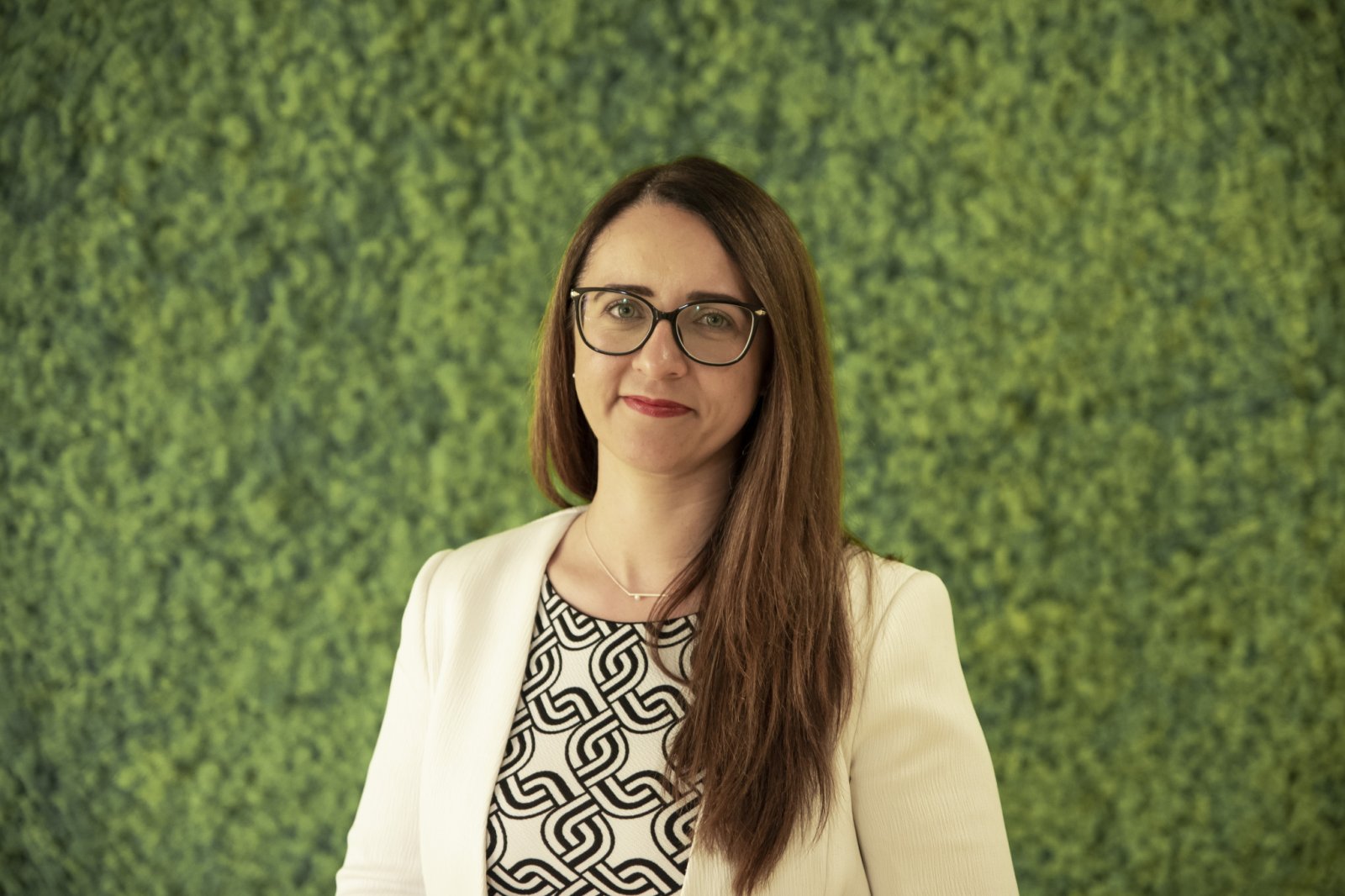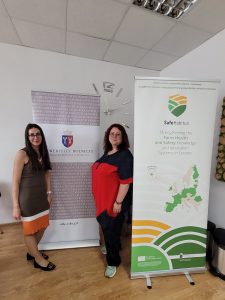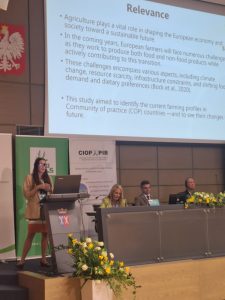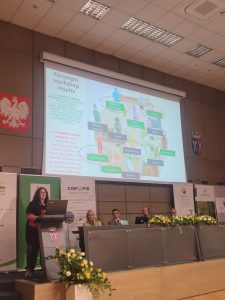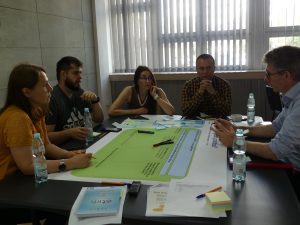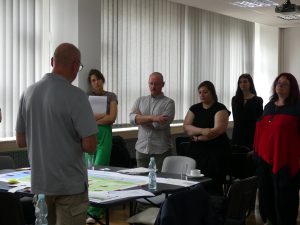Visit of Teachers of VMU Agriculture academy to Ege University
The teachers of Vytautas Magnus University Agriculture Academy Assoc. Prof. Dr. Midona Dapkienė (Department of Water Engineering, Faculty of Engineering), Prof. Dr. Laima Česonienė and assoc. prof. dr. Daiva Šileikienė (Department of Environment and Ecology, Faculty of Forest Sciences and Ecology) and Assoc. Prof. Dr. Rita Pupalienė (Department of Agroecosystems and Soil Sciences, Faculty of Agronomy) visited Ege University according to Erasmus+ Mobility agreement on September 15th to 18th 2025.
Ege University is a public university located in Izmir, in the Aegean region of Turkey. The university consists of 20 faculties, 10 institutes, 11 vocational schools, and 38 application and research centers. As of 2025, Ege University employs 2,974 academic staff members and has 52,873 students. The Faculty of Fisheries is one of the university’s faculties, training innovative and competitive undergraduate and graduate aquaculture engineers. It comprises 3 departments, 7 divisions, and 362 students.
The teachers from VMU Agriculture Academy introduced their university, faculties, and Aquaculture Center, and delivered lectures to bachelor’s and master’s students in Aquaculture, as well as in Fishing Technology and Seafood Processing Technology study programmes. Students from the Faculty of Agriculture were also invited to attend the lectures. The lecture topics included: surface water quality and causes of pollution; EU environmental policy in agriculture and aquaculture; aquaculture in Lithuania – its status, challenges, and opportunities; research methodology in agriculture, and more.
The representatives of VMU Agriculture Academy met with colleagues from the Faculty of Fisheries and its administration, became acquainted with the study programs and research conducted at the faculty, and discussed potential collaboration opportunities.
The teachers sincerely thank Ege University International Relations Coordinator Assoc. Prof. Dr. İilker Aydın and Assoc. Prof. Dr. Ozan Soykan (Department of Fishing Technology and Seafood Processing Technology) for their valuable assistance during the visit to Ege University.
Mudanya University researcher Dr. S. Şengül’s lecture “What is Economics?”
On September 29 at 1:00 PM, a lecture titled “What is Economics?” will be delivered by Dr. Serkan Şengül, Head of the Department of Economics and Finance at Mudanya University (Turkey). The event will take place at the Faculty of Bioeconomy Development of Vytautas Magnus University Agriculture Academy, in Room 420, Building III (Universiteto St. 10, Akademija, Kaunas District).
Dr. Serkan Şengül holds a PhD in Economics from Yıldız Technical University, and completed master’s programs at Kadir Has University (Economics) and Tilburg University (Quantitative Finance and Actuarial Science). He also pursued undergraduate studies at Istanbul Bilgi University and the University of London (LSE Program), focusing on Mathematics
and Economics.
His research interests include financial regulation, systemic risk, public finance, energy economics, agricultural and fisheries economics, and spatial econometrics. Dr. Şengül has published extensively in national and international journals (ESCI, SCOPUS, SSCI, SCI-E) and presented papers at numerous international conferences. He is also the author and co-author of several book chapters on financialization, economic diplomacy, and sustainable development. Dr. Şengül teaches a wide range of economics and finance courses, including Microeconomics, Macroeconomics, Monetary Theory, and Game Theory.
Organisational and IT-supported models for growing local food markets for food security in the Baltic Sea Region and Ukraine
Professor Dr. Vilma Atkočiūnienė and PhD student Aušra Žliobaitė from the Faculty of Bioeconomy Development at the Vytautas Magnus University Agriculture Academy participated in the event series “Integrating the Short Food Supply Chain to Ensure Food Safety”, organized by the Swedish University of Agricultural Sciences, held in Kraków, Poland, from July 9 to 13, 2025.
The events are part of the Swedish Institute funded project “Organisational and IT-supported models for growing local food markets for food security in the Baltic Sea Region and Ukraine” (SFSC4FOODSEC). The project aims to create a learning and support network for those who shape short food supply chains (SFSC) in local markets in the Baltic Sea region and Ukraine, with the aim of sharing experiences, building capacities and developing common IT support mechanisms that would promote stable and resilient food systems.
Within the framework of the SFSC4foodsecurity networking project, partners from Poland, Sweden, Lithuania, Latvia and Ukraine, as well as representatives from the food sector and municipal institutions in Krakow, met. Good examples of short food supply chains in Krakow were also visited. The aim of these meetings was to assess how the development of short food supply chains could contribute to ensuring food safety in the Krakow metropolitan area, as well as in the Baltic countries and Ukraine.
The event of the first day of meetings was attended by Aušra Žliobaitė from the Chamber of Agriculture (Lithuania), Prof. Vilma Atkočiūnienė from Vytautas Magnus University (Lithuania), Aiva Apsa Kisemice from the Rural Development Forum (Latvia), Lisa Blix Germundsson from the Swedish University of Agricultural Sciences (Sweden), First Deputy Mayor of Krakow Stanisław Mazur, Head of the Krakow “Jednosc” Foundation, whose main activity is to organize educational activities for children and adolescents of Ukrainian refugees and to build stronger Polish-Ukrainian relations, Olena Postolnyk, expert of SFSC Rafał Serafin from “IsoTech” (Poland), and Krzysztof Gorlich, Head of the Krakow Inter-institutional Working Group, which is preparing the Krakow Development Strategy 2030/2050. One of the Krakow Development Strategy areas is the development of short food supply chains and food security.
The events examined the potential of short food supply chains linked to non-industrial agriculture in the Krakow metropolitan area in ensuring food security during a crisis.
Eastern Poland has a strong agricultural tradition and produces a wide variety of food products, but in Krakow, the development of short food supply chains faces significant obstacles. The city has about a million inhabitants, but local organizations, not realizing the importance of food security, prefer to invest in urban infrastructure, parks and recreation areas. The influence of climate change and foreign capital (France, England) further accelerates urban development, displaces local agriculture, and farmers move their farms to central Poland or other regions.
It is no longer enough for a “place” to feed city dwellers and tourists with products produced by local farmers in Krakow. The question arises as to how secure the city can be in terms of food supply when producers are located far away. Can large mono-farms ensure sufficient food security? One possible solution is to encourage small farms to remain in place and to strengthen their ability to produce and sell food locally. This requires modern digital solutions that facilitate logistics and the availability of local products.
Polish agriculture is under great pressure from environmentalists, urban planners and city dwellers, often losing this battle of interests. Being a farmer in the Kraków municipality is becoming increasingly difficult. The surplus of food seen in supermarkets often obscures a conscious understanding of where the food came from and reduces the appreciation of farmers’ work. The best land suitable for farming, which can be irrigated by river water, is often given over to urban development.
Polish agriculture is characterised by a large number of small, family-run farms, which, despite their limited scale, maintain the rural economy and traditions. The SFSC strategy gives these farms the opportunity to strengthen direct links with consumers, increase profit margins, reduce dependence on intermediaries and promote ecological practices. They also strengthen communities through participatory models and promote the development of rural areas.
The benefits of investing in SFSCs include environmental benefits – reduced transport emissions and biodiversity, economic gains through direct trade and collaboration, social benefits through community and participatory governance through multi-level partnerships. At the same time, there are challenges: limited scale of production, complex regulatory environment, competition with industrialized systems, and issues of cooperation and power imbalance.
At the meeting, Deputy Mayor of Krakow Stanisław Mazur stressed the need to clearly define the role of the SFSC in the city’s strategy. Several key aspects were highlighted:
- Creating local demand – public procurement (especially for schools and public institutions) could become a key tool to encourage local farmers to produce food products.
- Revitalizing markets and food markets in the city of Krakow and its suburbs – they can become an alternative to retail chains and contribute to the creation of vibrant public spaces.
- Strengthening food infrastructure – it is necessary to improve logistics, warehousing, and develop digital platforms that would allow producers to reach consumers directly.
- Partnership management – a successful local food policy is only possible in cooperation with regional governments, farmers, universities, NGOs and business representatives, and consumers.
Anatoly Tkachuk from the Ukrainian Institute of Civil Society presented an important experience. According to him, during the war it became clear that well-developed local production is not a luxury, but a vital necessity. Although millions of tons of grain and warehouses were destroyed, fields were mined and logistics infrastructure was destroyed, Ukraine did not experience hunger. Local communities, municipalities and small farmers developed gardens, community initiatives, created local food markets and thus ensured food supply. This experience shows that food sovereignty is inseparable from national security. This is a signal for Krakow to prepare for possible supply disruptions that may arise not only due to war, but also due to climate change or pandemics.
Aiva Apša-Ķīšeniece, a specialist in resilience and sustainable at the Latvian Rural Forum, noted that Riga is one of 116 cities whose representatives have signed the Milan Urban Food Policy Pact (MUFPP) – an agreement that commits to developing food policies and sustainable food systems that are inclusive, flexible, safe and diverse, provide healthy and nutritious food for all, reduce poverty, conserve and preserve biodiversity, while adapting to and mitigating the effects of climate change.
The leader of the project “Organizational and IT-supported models for growing local food markets for food security in the Baltic Sea Region and Ukraine” (SFSC4FOODSEC), prof. dr. Lisa Blix Germundsson from the Swedish University of Agricultural Sciences (SLU), Competence Center for Advisory Services, presented the project results, shared the experience and research results of Swedish short food supply chain developers.
Rafał Serafin from IsoTech (Poland), a network of short food supply chain consultants CORONET, presented the features of the APPETIT platform. He noted that there are opportunities to develop SFSC and national innovations at the regional level through closer cooperation. The alignment of CAP strategic plans could open up synergies in funding and policy implementation, and the proposed Baltic food and drink store network under the SFSC4FOODSEC initiative provides a platform for knowledge exchange and joint articulation of positions. The emerging model of urban-rural partnership in Krakow is a prototype that could be adapted across the region, especially if supported by the EU Urban Agenda funding mechanisms. The current food security crisis, highlighted by the resilient informal networks of Ukraine, is both a challenge and an opportunity to position food and drink sales as essential components of crisis-responsive food systems.
At one of the events, prof. Vilma Atkočiūnienė presented the specifics of SFSC development in Lithuania. V. Atkočiūnienė noted that preschool institutions in Lithuania are encouraged to feed children with organic and local products of national quality. A national program implemented since 2019 supports such feeding, and in recent years the support has increased both in financial volume and in the number of participating kindergartens. The support compensates for the price differences between intensively grown and organic and national quality products and is allocated to preschool institutions, which purchase most of their food according to quality systems.
The Lithuanian food market is dominated by large retail chains, which control about 77% of the total market, while local farmers often do not have direct access to the large market. As a result, small and medium-sized farms experience low profitability, have weak bargaining power and do not pool resources. Consumer trust in local products also remains low. Consumer demand for health-friendly, locally grown products is often unsatisfied.
In order to address these problems, it is recommended to promote farmer cooperation, increase the value of local products, form healthy eating habits, encourage the public sector to purchase local food products, and increase the purchasing power of the population and the availability of health-friendly products.
The organization of SFSCs can be both private farm decisions and the result of a partnership between the public sector and civic initiatives. The current situation is characterized by a narrow range of local products, high cost prices, low entrepreneurship of farmers, and limited contribution to strengthening the local economy.
The ideal local food system in Lithuania would be a networked one, covering the entire process from farming, processing, sales to consumption and waste management. It would be based on various business models (B2C, B2B, B2G), would combine cooperative and individual farm SFSCs, and would develop pilot and multi-stakeholder projects. The concentration of local products, geographical location, population density and infrastructure would be assessed when planning supply chains. The transition to the ideal model is proposed through community systems, multifunctional centers or food sharing HUBs, where farmers would coordinate the marketing, distribution and partial processing of local fresh products before providing them to consumers or wholesalers.
Project partners from Sweden, Poland, Latvia, Lithuania and Ukraine conducted national SFSC needs analyses. They revealed common obstacles:
- dominance of large retail chains (over 70% of the market in Poland and Lithuania),
- weak support for small producers,
- consumer habits prioritizing convenient shopping and cheaper products,
- gaps in logistics and infrastructure.
At the same time, “bridges” connecting the countries were identified:
- Lithuanian school feeding programs that include local products,
- Poland’s 2017 Agricultural Retail Act and Lithuania’s Law on Public Procurement (2023), which simplified direct sales,
- Latvia’s green public procurement,
- Sweden’s education campaigns about the value of local food,
- Ukraine’s community-based initiatives and digital food trading platforms.
On the second day of meetings, project partners participated in discussions with representatives of the Krakow city municipality, regional authorities, advisory centers, farmers, universities, NGOs, restaurants and markets. The discussions emphasized:
- there is a need to preserve agricultural lands in urban and peri-urban areas,
- strengthening the role of small-scale farming, community gardens, school gardens and farmers’ markets,
- the need to systematically integrate food issues into urban development and land use planning,
- the need to recognize local food products and develop critical infrastructure, local food systems.
All participants at the event agreed that regular meetings of stakeholders are needed, and Krakow could initiate the creation of a state agricultural exchange for both wholesale and retail trade in local products.
The discussions also highlighted that the development of short food supply chains is more than an economic opportunity – it is the basis for urban resilience, sustainability and social cohesion. Krakow, in cooperation with partners in the Baltic region and drawing on the experience of Ukraine, has the opportunity to become one of the leading European cities that recognises local food systems as a critical infrastructure and a priority for sustainable development.
During the last two days of the meeting, project partners visited examples of good practices, discussed innovations implemented by SFSC developers, policy measures, and new projects.
SFSC4FOODSEC the project is funded by the Swedish Institute
Information on Enrolment into Study Subjects
The first stage of the Autumn Semester 2025/2026 registration for lectures, seminars and laboratory work will take place on 21–26 August. At this stage, the registration is open to:
- Full-time and part-time students of bachelor’s and integrated studies (excluding 1st year students)
- Full-time and part-time students of master’s studies
- Full-time students of professional studies
- Part-time free-movers
- Part-time exchange students
Registration for first-year undergraduate and full-time students will take place on 28 August.
Enrolment will be conducted online only via the VMU Students’ Self-Service Portal at https://studentas.vdu.lt.
Students sign in using a username, which is name.surname (lowercase, Latin alphabet letters only), and a password.
If a student has forgotten their password, they can set up a new one at https://support.vdu.lt/. Instructions are available here: https://support.vdu.lt/pagalba/Migration_eng.pdf.
Registration for Sports and Arts Activities in the Autumn Semester
All Vytautas Magnus University (VMU) students are invited to register and join the artistic and/or sports activities organized by the VMU Sports and Arts Centres for the autumn semester of the academic year of 2025/2026.
All VMU students may attend sports or arts group activities regardless of their field of study or faculty (for example, law students can join the VMU Agriculture Academy’s folk dance group Sėja). All activities are free of charge for VMU students. You may register for several activities, so we encourage you to actively join the activities offered by the Sports Centre or the Arts Centre collectives to spend your free time meaningfully, actively, and culturally.
Registration for Arts Centre Activities
Students who wish to act, dance, sing, or play music can join one of the VMU Arts Centre collectives located in Kaunas, Akademija (Kaunas District), or Vilnius. To do this, you need to register for the offered activities.
How to register for artistic activities:
Log in to the Student Portal. In the menu bar, select Registration. In the opened section, click the button Sports / Arts Activities. In the next step (Registration for activities), choose Arts and select your desired collective. Mark your choice, click Continue, then I agree with the conditions, and finally click REGISTER.
You can also register the same way at menucentras.vdu.lt/registration
The chosen Arts Centre activities will be visible in the My Activities section of the Student Portal. You can also withdraw from chosen activities via the Student Portal. Once registered, you may begin attending according to the schedules of the collectives.
Registration and deregistration for specific Arts Centre collectives is available throughout the entire 2025/2026 autumn semester.
More information:
Registration for Sports Centre Activities
All VMU students wishing to use VMU Sports Centre facilities (11 Studentų str. and 9A Studentų str., Akademija, Kaunas District) can register for sports activities.
How to register for sports activities:
Log in to the Student Portal. In the menu bar, select Registration. In the opened section, click the button Sports / Arts Activities. In the next step (Registration for activities), choose Sports. Select your preferred sport, click Continue, then I agree with the conditions, and finally click REGISTER.
You can also register the same way at sportas.vdu.lt/registration
The selected sports activities will be visible in the My Activities section of the Student Portal. You can also withdraw from chosen activities in the portal. Once registered, you may begin attending according to the announced schedule.
Registration and deregistration for specific sports activities is available throughout the entire 2025/2026 autumn semester.
More information:
For those seeking to confidently climb the ladder of a promising career – MBA Study Programme in Customs Process Management
The ability to confidently and professionally manage customs processes is especially important for those aiming to work in international companies involved in trade operations. This sector stands out for its career prospects, motivating salaries, and a shortage of highly qualified specialists and managers in the labour market. The MBA programme in Customs Process Management at Vytautas Magnus University Agriculture Academy (VMU AA) is popular due to its unique opportunity to gain knowledge from professionals working in international markets and its flexible study format tailored to working specialists. This intensive one-year programme is delivered in English, fully online, with lecturers who are recognised practitioners in Lithuania and abroad sharing their experience and insights with students.
A Programme for Future Leaders in the Customs Business
The Chair of the study programme committee and lecturer Assoc. Prof. Dr. Erika Besusparienė notes that the MBA programme in Customs Process Management is designed for those pursuing a career or leadership positions in the customs business. It is currently the first MBA programme in customs in Lithuania. Graduates will be awarded the internationally recognised Master of Business Administration degree.
“In the European context, Master’s studies in customs face two challenges: in some countries, they are conducted in the national language, while in others, customs is only a specialisation. In our discussions with business representatives and based on changes in the EU as well as the EU Customs Competency Framework, we aim to offer a study programme that covers customs comprehensively while also integrating other essential competencies,” says Assoc. Prof. Dr. E. Besusparienė.
The Chair of the programme committee explains that the main pillars of the programme’s development were education in the customs field based on the EU Customs Competency Framework and the EU Customs Vision 2040. Therefore, the study programme integrates customs and taxation. On 30 June 2025, the programme Customs Process Management was awarded the EU Customs Recognition Certificate. This certificate confirms that the study programme meets EU-level customs competency requirements.
“Of course, customs and taxation alone are not sufficient for a future leader. That’s why the programme also includes international trade through supply chains, sustainable customs management, communication, and, considering new risks, elements of social responsibility, ethics, and environmental measures,” lists Assoc. Prof. Dr. E. Besusparienė. She adds that students see the programme as highly relevant to current issues, with lecturers sharing not only up-to-date theoretical knowledge but also valuable practical insights.
The Chair of the study programme committee and lecturer Assoc. Prof. Dr. Erika Besusparienė
Instead of a Master’s Thesis – a Project-Based Paper
Another unique aspect of the programme, according to Assoc. Prof. Dr. E. Besusparienė, is that instead of writing a traditional Master’s thesis, students complete a smaller-scale final project focused on solving a practical problem or implementing innovations in business or national systems.
“The final project allows students to express their creativity and innovative thinking. It may be directly linked to specific business needs, helping students to establish or strengthen connections with real-world labour market challenges. We constantly strive to find ways to help students reach their professional goals through this intensive programme and open new opportunities for them,” explains Assoc. Prof. Dr. E. Besusparienė.
The committee chair emphasises that the Customs Process Management MBA programme is suitable for those wishing to change professions or advance in their careers. “We closely collaborate with the Lithuanian Customs Practitioners’ Association, are members of INCU, and the Customs Knowledge Institute. Our students also have the opportunity to participate in these international networks, expand their knowledge, and build global connections – all of which provide excellent career prospects.
So, if a person has completed a Bachelor’s degree and gained three years of work experience (regardless of whether they worked as a manager, accountant, logistics specialist, or in another role), they are eligible to apply to the Customs Process Management MBA programme. The most important thing is inner motivation to advance one’s career, which is why motivation plays a key role in the admissions process,” concludes Assoc. Prof. Dr. E. Besusparienė.
International scientific seminar Biomass for Energy
The International Scientific Seminar
BIOMASS FOR ENERGY
The International Scientific Seminar BIOMASS FOR ENERGY
The International Scientific Seminar
BIOMASS FOR ENERGY
29 July, 2025
SafeHabitus Summer School 2025
The SafeHabitus project hosted the 3rd SafeHabitus Summer School on 25 – 27 June 2025, Kraków, Poland. This three-day event served as a collaborative platform for all SafeHabitus project partners and Communities of Practice to foster the exchange innovative ideas, and to learn from each other and other international stakeholders. A significant highlight of this year’s edition was the SafeHabitus and International Social Security Association (ISSA) Joint Colloquium on “The Prevention’s Role in Advancing Social Sustainability in Agriculture”. Assoc. prof. dr. Anastasija Novikova and assoc. prof. dr. Laura Girdziute participated in this event and made a presentation on Farming profiles in Europe, revealing the Challenges and Insights from CoP Countries.
This two-day colloquium gathered international stakeholders, including occupational safety and health (OSH) experts, researchers, and national institutions. These dialogues explored comprehensive preventive strategies vital for the occupational, economic, and social well-being in farming, with a strong emphasis on critical aspects of physical and mental health support for farmers and farm workers.
Furthermore, the Summer School hosted the Transnational Communities of Practice (CoP) meeting. The 11 SafeHabitus CoPs engaged in collaborative workshops, identifying and mapping good practices crucial to the project’s core objectives: physical and mental health, machinery safety, livestock farm safety, and the common well-being of all farmers and farm workers. The outcomes of the workshops will directly inform the development of a research tool supporting the development of good practices in farm safety and health across the sector.
Media contact: National CoP representative Anastasija Novikova (Lithuania), anastasija.novikova@vdu.lt
More information:
About the Joint Colloqium:
The event is organised by the International Section of the ISSA on Prevention in Agriculture, in cooperation with SafeHabitus, Agricultural University in Krakow, Poland, Kasa Rolniczego Ubezpieczenia Społecznego (KRUS), Państwowa Inspekcja Pracy (PIP), and the Central Institute for Labour Protection – National Research Institute (CIOP-PIB).
About SafeHabitus:
SafeHabitus project is a four-year project coordinated by TEAGASC Ireland, funded by the European Union as part of the Horizon Europe Programme, grant agreement number 101084270. This multi-actor project aims to strengthen Farm Health and Safety Knowledge Innovation Systems (FHS KIS) and support the EU transition to social sustainability in farming.
Empowering Young Entrepreneurs: Erasmus+ BIP “Management for Business Startups” at VMU Agriculture Academy
Vytautas Magnus University Agriculture Academy (VMU AA) in Kaunas, Lithuania, recently hosted a dynamic and multicultural Erasmus+ Blended Intensive Programme (BIP) titled “Management for Business Startups – 2025 Summer Course.” Taking place from June 2 to 13, 2025, the programme was designed to provide both bachelor’s and master’s students with essential entrepreneurial skills and tools to develop, plan, and present their own business ideas. The blended format combined online instruction with on-site mobility in Lithuania, enabling students to engage across borders while gaining practical insights into startup creation and business modelling. Awarding 3 ECTS credits, the course brought together a vibrant group of participants from Estonia, Greece, Germany, India, Kazakhstan, Mauritius, Poland, Romania, Sierra Leone, Slovenia, and Ukraine, creating a truly global learning environment. This BIP course emphasized experiential learning, intercultural exchange, and collaborative project work, making it a valuable platform for fostering entrepreneurial thinking within a European and international framework.
Blended Format: Virtual Knowledge Meets Real-World Practice
The course followed a thoughtfully structured approach. During the first week, participants joined virtual sessions exploring the use of robotic process automation (RPA) in business, designing software automation scenarios, and tackling themes such as sustainable production, marketing strategy, and business development frameworks. These sessions laid the groundwork for the hands-on collaboration and final project preparation that followed.
Academic Engagement in an International Environment
The second week unfolded on-site in Kaunas, where students gathered for in-person workshops focused on business modeling, financial planning, budgeting, and marketing tactics. Each day introduced new elements vital to startup success. The academic sessions were led by an accomplished international teaching team, including Prof. Dr. Jan Žukovskis (VMU), Prof. Dr. Gunta Grīnberga-Zālīte (Latvia), Prof. Dr. Paula Pyplacz (Poland), Assoc. Prof. Dr. Janusz Sasak (Poland), and Mgr. Tuuli Kaasik (Estonia). Prof. Dorota Chudy-Hyski from the University of Silesia in Katowice and Karolina Hyski from the University of Economics in Katowice participated in the project evaluation process, providing professional feedback and contributing to the academic integrity and practical relevance of the student startup ideas. Alongside the educational programme, students toured Kaunas Old Town, visited Vilnius, and enjoyed excursions through VMU’s picturesque Agriculture Academy campus. Evening activities and informal gatherings deepened connections between participants and added cultural richness to the academic experience.
A Diverse and Multidisciplinary Cohort
The programme brought together thirty-six students from eleven countries and sixteen partner universities. Participants represented a wide spectrum of academic disciplines including agriculture, environmental science, economics, marketing, logistics, and digital business. Their international and interdisciplinary collaboration led to a vibrant and idea-rich learning environment where new business concepts were born and developed.
Pitching Startup Ideas with Confidence
Throughout the week, students worked in teams to refine business ideas, build budget plans, and prepare pitches. The final day featured formal presentations before a panel of lecturers and peers simulating investor discussions. These sessions not only tested participants’ ability to communicate and justify their concepts, but also celebrated their innovation, teamwork, and leadership skills. Each student was awarded a certificate recognizing their academic and collaborative achievements.
Reflections from Participants
Feedback gathered after the programme revealed a high level of satisfaction. Nearly all participants rated the course as excellent or very good. They especially appreciated the interactive format, the practical orientation of the course content, and the supportive international atmosphere. Students distinguished the academic quality of the lectures, the professionalism of the faculty, and the chance to apply theory in real-world-inspired settings. Suggestions included adding even more time for face-to-face learning and expanding future sessions to include advanced startup simulations.
Looking Ahead: A Model of Entrepreneurial Education
The 2025 Management for Business Startups BIP stands as a testament to VMU Agriculture Academy’s commitment to advancing entrepreneurship education through international cooperation and innovative teaching methods. It equipped students with essential business competencies, boosted their confidence, and built lasting cross-border connections that will carry into future professional ventures.
Erasmus BIP partner universities: Akhmet Baitursynuly Kostanay Regional University , Almaty Management University, Czestochowa University of Technology, Estonian University of Life Sciences, Jagiellonian University, Latvia University of Life Sciences and Technologies, Military University of Technology, Reutlingen University, University of Maribor, University of Mauritius, University of Oradea, University of Siedlce, University of Silesia in Katowice, Warsaw University of Life Sciences.
Prepared by dr. Monika Medikienė (International Coordinator of VMU AA) and prof. dr. Jan Žukovskis (Faculty of Bioeconomy Development).
Co-Funded by the European Union. Views and opinions expressed are however those of the author(s) only and do not necessarily reflect those of the European Union or the European Education and Culture Executive Agency (EACEA). Neither the European Union nor EACEA can be held responsible for them.
- About
- About Agri-Food BM programme
- Academic infrastructure units
- All events
- All news
- Aquaculture center
- Archives
- Biosystems Engineering
- Center of Animal husbandry selections, breeding values and dissemination
- Centre of Biosystems Engineering, Biomass Energetics and Water Engineering
- Circular Biobased Economy
- Climate change
- Contacts
- Contacts
- Events
- Events archive
- Faculties
- For business and society
- Innovative products
- International Cooperation
- International projects
- Joint Research Centre of Agriculture and Forestry
- Journal “Human and Nature Safety”
- Laboratory of Technology Safety
- Laboratory services
- Living Environment
- More labs
- News
- Project
- QUALS project description
- Research
- Research areas
- Scientific events
- Scope
- Sitemap
- Studies
- Study programmes
- Technology Transfer & Commercialization
- THE ROLE OF ORGANISATION IN THE PROJECT
- THE ROLE OF ORGANISATION IN THE PROJECT
- THE ROLE OF ORGANISATION IN THE PROJECT
- The Study Process
- Žemės ūkio žinių ir inovacijų sistemos klasteris







